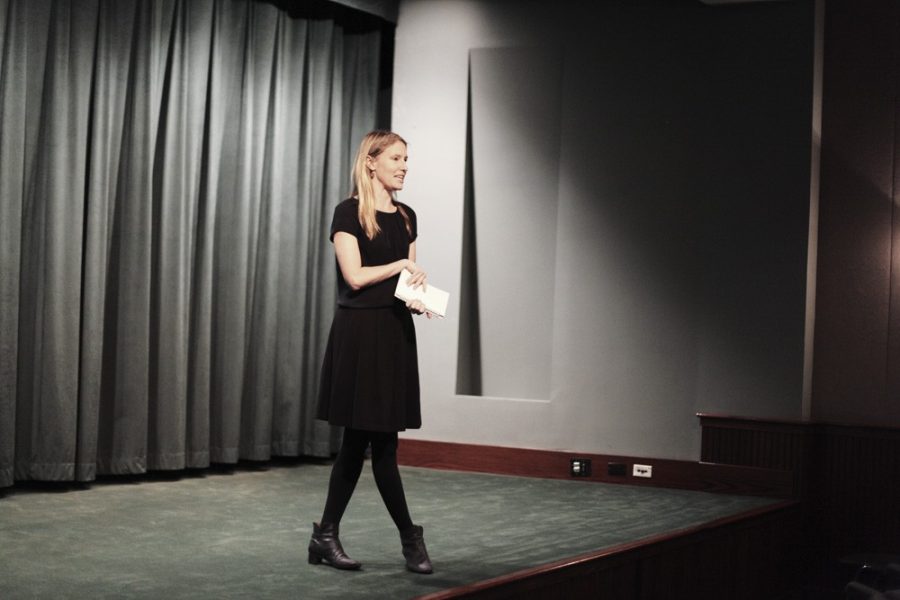A new documentary, screening on the UA campus, will provide insight into the experiences of eight women who were sexually assaulted.
On Tuesday, Jennifer Baumgardner will host a screening of her new documentary, “It Was Rape.” Following the viewing, Baumgardner will host a discussion with audience members.
In the United States, someone is sexually assaulted every two minutes, and 54 percent of these cases are not reported to the police, according to the Rape, Abuse and Incest National Network.
In 2008, Baumgardner came up with the idea to create a documentary that would bring attention to rape and provide those who were raped with a voice. As a feminist, this has always been an issue that Baumgardner said she has followed.
“I’m really interested in topics that you’re not allowed to talk about. Rape is a very common experience that is misunderstood and silenced,” Baumgardner said. “We don’t get that many chances to hear from people who have been victimized so this film allows us to hear their stories. But it’s kind of more than that, it’s getting to see their lives.”
The film screening was coordinated and sponsored by the UA Oasis Program, Wingspan Anti-Violence Program, the Women’s Resource Center and the Feminists Organized to Resist, Create and Empower.
Sarah Bahnson, the anti-violence program advocate and educator at Wingspan, Southern Arizona’s lesbian, gay, bisexual and transgender community center, met Baumgardner at Soapbox Inc.’s Feminist Boot Camp in the winter of 2012. Bahnson said, since then, she has followed the progress of the “It Was Rape” project and she came up with the idea to hold a screening at the UA.
“It is important to provide a safe venue for survivor stories to happen. Sometimes survivors have the misfortune of being re-traumatized by the support networks that they have because they don’t always know how to react,” Bahnson said. “In being able to tell their story and having their friends and loved ones educated on supportive ways to help them, it will be an asset to our community.”
When Baumgardner first announced that she was producing a film about sexual assault, she said she was immediately approached by a number of survivors, each with a story to tell.
“I’ve never had to talk about the experience, the circumstances around it, and how it impacted my life for more than 40 minutes in a therapy session, so speaking about it for five hours was a much different experience,” said New Jersey native, Wagatwe, whose story is featured in the documentary. She requested her last name not be used.
“It was especially different knowing it is intended for an audience in the context of a video instead of confiding in a friend, professional or police officer,” Wagatwe said.
Having never before revealed such a vulnerable chapter of her life to the public eye, Wagatwe said she recognized the impact that this documentary made on her in regards to instances in the past.
“A big aspect of my experience was not being believed and, sort of, punished for coming out and reporting. Now, I am able to overcome that,” Wagatwe added.
The Oasis Program works to prevent and respond to sexual assault and relationship violence through outreach and counseling at the UA. Megan McKendry, the violence prevention specialist with the Oasis Program, said she thinks the film has the potential to connect with students and provide them with information and a sense of unity.
“It is important to hear survivors’ stories. This film is a tremendous tool to help people understand the issue of sexual assault and to build empathy for survivors and also to prevent violence on campus,” McKendry said. “Perhaps people in the audience who have experienced sexual assault will feel some community and understand that they are not alone.”
Kathe Young, a psychologist for Oasis, also said she knows first-hand the effects that sexual assault can have on an individual and acknowledged the insight this documentary will provide.
“It is so important to raise awareness and have voices of survivors heard because this is still such a misunderstood and stigmatized area,” Young said. “Often, survivors feel judged or blamed for the violence they have experienced, so hopefully, an event like this will help create empathy and understanding in the campus community.”
Baumgardner said she hopes the documentary will make the audience feel connected with each of the women.
“I think their stories are really shocking but at the same time, we have all heard these stories if we have ever talked to a friend who has had an experience,” Baumgardner said. “People who have been raped are people we know well. They are not nameless, faceless people. They are ourselves, our sisters, our moms, our grandmas and our daughters.”
Baumgarnder said it was challening to portray the stories in an uplifting way, but said she is proud of the final result.
“I was asking people to tell me about one of the most horrible things that have ever happened to them and the aftermath, which was often worse, and really getting them to relive the experience,” Baumgardner said. “I don’t want the audience to walk away feeling totally defeated and so the hardest part was making [the film] so that it was empowering, but I feel like I did.”
If you go:
When: Tuesday, March 26, 6:30-8:30p.m.
Where: Modern Languages, Room 350
Additional information about the UA Oasis Program:
The Oasis Program offers free advocacy services, two free sessions of individual counseling to students, staff, and faculty impacted by sexual assault, relationship violence, and stalking, and free support groups for female-identified rape/sexual assault survivors.
For more information about counseling services call: 520-626-2051
The program also offers free awareness-raising and prevention workshops to campus groups.
You can request a presentation by calling 520-626-1829 or emailing McKendry@health.arizona.edu.








